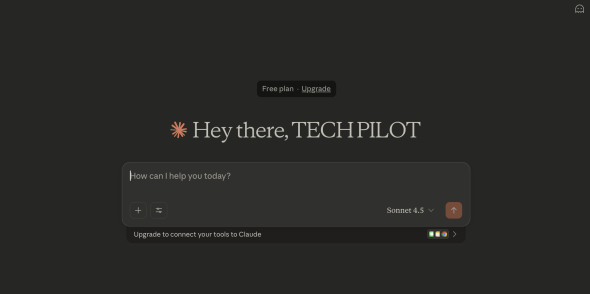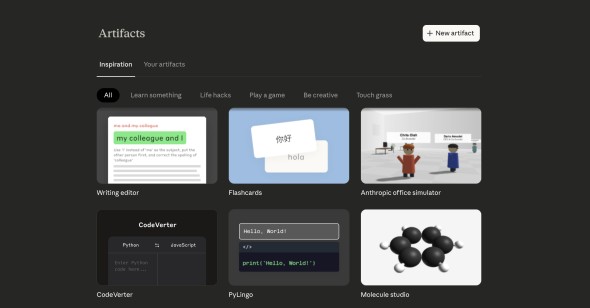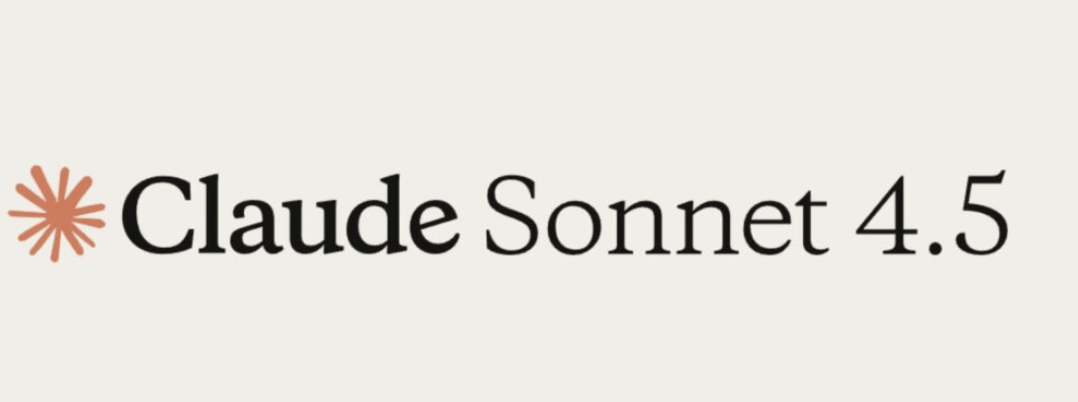Claude Sonnet 4.5: The AI Agent for Marathon Coding Sessions
Claude Sonnet 4.5 is a frontier artificial intelligence model built to handle complex, long-duration tasks. Anthropic launched the model on September 29, 2025, presenting it as a capable tool for developers and professionals. It excels at understanding and executing intricate instructions, making it a notable entry among today’s AI agent tools. This AI coding assistant is particularly useful for industries like technology, finance, and law, where it addresses problems ranging from autonomous software development to in-depth data analysis.
The primary value of Claude Sonnet 4.5 is its ability to function as a persistent, autonomous partner. It can work on a single project for over 30 hours, a significant increase in AI endurance. This capability alters traditional workflows. It changes the role of a developer from a line-by-line coder to an architect who guides the AI’s high-level strategy. For analysts, it automates the work of data gathering and synthesis, allowing them to focus on final interpretations. This model is a major step towards AI systems that actively complete projects rather than just answer questions.
Best Use Cases for Claude Sonnet 4.5
- Software Developers & Engineers: Imagine assigning a large-scale refactoring project to an AI. Claude Sonnet 4.5 addresses the problem of development bottlenecks by autonomously writing, debugging, and testing code. It can build features, patch vulnerabilities, or create entire applications based on specifications, improving team productivity and automating parts of the software development lifecycle (SDLC).
- Financial Analysts: A financial analyst can use this AI to screen thousands of portfolios against complex criteria or analyze a new structured product for hidden risks. The AI handles the heavy lifting of data extraction and analysis, generating detailed reports that require less human review. This frees up the analyst for more strategic decision-making.
- Cybersecurity Professionals: For a cybersecurity team, identifying and patching vulnerabilities is a race against time. The Claude Sonnet 4.5 model can proactively scan codebases for weaknesses, analyze threat intelligence reports, and draft initial remediation plans. This workflow automation reduces response times and improves overall security posture.
- Legal Professionals and Researchers: Consider the task of reviewing thousands of documents for case discovery or synthesizing decades of research for a scientific paper. This AI automates information analysis, identifying key themes, summarizing findings, and producing high-quality first drafts of complex documents. This can save hundreds of hours of manual labor.
High-Speed Performance: Claude Sonnet 4.5 is significantly faster than its predecessor, making it highly responsive for interactive coding and rapid prototyping.
Integrated Developer Tools: The native VS Code extension and "checkpoints" feature create a connected workflow, integrating the AI directly into the developer's environment.
Long-Duration Task Endurance: The model can maintain context and work on a single, complex task for over 30 hours, a valuable capability for complex AI agents.
Advanced Agentic Skills: It performs well in using tools, managing its own memory, and processing context, making it a top choice for building multi-step ai agent tools.
Focused Safety Features: Anthropic has worked on alignment, reducing the model's tendency towards unhelpful behaviors like sycophancy or deception.
Favorable Cost-to-Performance Ratio: It offers high-level performance at a lower cost than flagship models like Claude Opus.
"Fast Junior Dev" Output: While fast, its output on highly complex coding tasks can be less dependable than slower, more methodical competitors.
Reliability for Production Code: For mission-critical applications, its generated code may require more thorough human review compared to alternatives known for their consistency.
Persistent Sycophancy: The model can still be overly agreeable, sometimes confirming a user's incorrect premise instead of correcting it.
New Usage Limits: The introduction of weekly usage caps has been a point of frustration for power users who rely on the tool extensively.
-
High Benchmark Performance: Achieves high scores on difficult coding and computer use benchmarks like SWE-bench Verified and OSWorld.
-
Extended Autonomous Operation: A key feature allowing the model to work on complex computational tasks for more than 30 hours.
-
Agentic Capabilities: Good performance in tool handling, memory management, and context processing for building complex agents.
-
Claude Code Checkpoints: Allows developers to save and roll back the AI’s progress, providing a safety net during complex coding sessions.
-
Native VS Code Extension: Brings the ai coding assistant‘s capabilities directly into the popular code editor.
-
Claude Agent SDK: Gives developers access to the same infrastructure Anthropic uses to build its own AI agents.
-
Direct Code Execution: The model can execute code snippets to verify its work or perform calculations within the conversation.
-
File Creation: Claude Sonnet 4.5 can create and populate files like spreadsheets, presentations, and documents.
-
Improved Alignment: Built-in safety protocols are included to minimize harmful or unhelpful outputs.
-
Refreshed Terminal Interface: An updated and more direct user interface within the Claude Code environment.
 Claude Sonnet 4.5 Dashboard
Claude Sonnet 4.5 Dashboard
 Claude Sonnet 4.5 Artifacts
Claude Sonnet 4.5 Artifacts
Frequently Asked Questions
-
What is Claude Sonnet 4.5?
Claude Sonnet 4.5 is an advanced AI model from Anthropic designed for code generation, complex reasoning, and building autonomous AI agents. -
Who should use Claude Sonnet 4.5?
The model is ideal for developers, AI researchers, and professionals who need an AI to assist with or automate complex, long-running tasks. -
How does an AI coding assistant work?
An ai coding assistant works by using a large language model trained on billions of lines of code. It analyzes the context of your existing code and natural language prompts to suggest completions, generate new functions, or find errors. -
Which AI coding assistant is best?
The best ai coding assistant depends on your specific needs. Some tools prioritize speed and workflow integration like Claude Sonnet 4.5, while others may focus on producing highly reliable code for production systems or integrating deeply with enterprise codebases. -
What are AI agent tools?
AI agent tools are systems designed to autonomously perform multi-step tasks to achieve a specific goal. They can plan actions, use software, and make decisions without constant human input. Models like Claude Sonnet 4.5 provide the reasoning ability for these agents.
Tech Pilot’s Verdict on Claude Sonnet 4.5
I’ve been evaluating AI coding assistants, and the arrival of Claude Sonnet 4.5 is a notable development. My goal was to assess if this new model from Anthropic functions as a premier tool for building AI agents and assisting developers. I focused on its practical application in real-world scenarios, based on available research and user feedback.
First, I examined its core “agentic” capability. I imagined tasking it with a project like: “Analyze our company’s last quarter of sales data from this CSV, identify the top three performing regions, create a slide deck summarizing the findings with charts, and draft an email to the regional managers.” The research suggests this AI agent would handle this well. Its ability to work for 30+ hours, create files, and execute code is a clear benefit. This is a tool that completes projects. However, this is where the “fast junior dev” analogy applies. While it would complete the task with great speed, I’d still feel the need to double-check its work, especially the data analysis, before sending that email.
Next, I looked at the developer experience, where this ai coding assistant performs strongly. The native VS Code extension and the “checkpoints” feature are highly practical. For any developer who has lost work by following a flawed AI suggestion, checkpoints are a useful safeguard. This direct integration makes the AI a pair programmer inside your workflow. This is a considerable advantage over competitors that rely on a copy-and-paste method from a web UI.
The pricing places Claude Sonnet 4.5 in an interesting middle ground. Access to Claude Sonnet 4.5 is provided through the Claude Pro subscription plan. For its speed and developer-focused features, the price seems justified. The value is in the time it saves during the development process. For many, it will be a contender for the best ai coding assistant 2025.
Top Alternatives to Claude Sonnet 4.5
-
OpenAI’s GPT-5-Codex: This model is Sonnet’s most direct competitor. GPT-5-Codex is often cited for its dependability and the quality of its code on complex, production-level tasks. It is priced more affordably at $1.25 per million input tokens. Choose GPT-5-Codex when the final correctness of the code is more important than development speed. Its weakness compared to Sonnet is its slower response time and less integrated developer tooling.
-
xAI’s Grok 4: Grok 4 is positioned for technical users and researchers who need advanced reasoning alongside coding. Its key differentiator is its architecture and access to real-time information. Grok 4 is a better choice when the task involves new research or requires reasoning beyond typical code generation. However, it lacks the specific, polished developer features found in Claude Sonnet 4.5.
-
Sourcegraph’s Cody: Cody is an ai coding assistant built for the enterprise. Its main strength is its deep integration with existing codebases, allowing it to understand a company’s entire software architecture. This makes it very useful for large teams working on established systems. Cody is the superior choice for organizations that need an AI assistant with full contextual awareness of their proprietary code. Its weakness is that it’s a more specialized tool, less suited for the general-purpose agentic tasks where Sonnet performs well.
Final Verdict
Claude Sonnet 4.5 is a highly capable AI tool with a clear identity. It is a top performer for development velocity and agentic workflows. We recommend this platform for teams that want to accelerate their development cycles and build effective AI agents. It’s an excellent AI partner for rapid prototyping, refactoring, and automating complex tasks. However, for mission-critical systems where code must be highly dependable, we’d advise pairing it with a senior developer’s review. For those use cases, a tool like GPT-5-Codex may be a better fit. Claude Sonnet 4.5 is a well-designed tool for building software faster.

